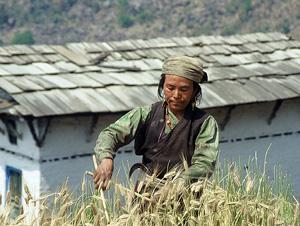Women’s health in Nepal
Nepalese woman harvesting barley (Image: flickr user World Bank Photo Collection (cc:by-nd))
The following is not a full transcript; for full story, listen to audio.
Almost a third of Nepal’s population lives on less than a dollar a day, and political turmoil has displaced tens of thousands of people. For Nepalese women, life is particularly difficult. The country has a long record of discrimination and exploitation, and maternal mortality in Nepal has historically been among the highest in Asia.
Dr. Sangeeta Mishra is trying to change that. She is a gynecologist from Nepal. She has spent much of the past year as a Fulbright Scholar at Johns Hopkins University. On "Here and Now" she talks about how women’s health issues are addressed in Nepal.
Dr. Mishra: "These women they are not coming to the clinics, they don’t have access to the hospital, so sitting in the clinic and solving the problem [on a] one-on-one basis, it doesn’t work for Nepal.
"First thing which I realized was a major problem in Nepal was high rate of maternal mortality, and women were dying due to pregnancy-related complications. Women … are not aware of pregnancy [complications] … it’s just a normal thing and that they can deliver at home and they are not aware of the consequences that pregnancy can bring.
"So I plan to develop a major educational and awareness generation program for these women, where most of the deaths occur … to [inform] them of the importance of delivering at the hospital, or having a skilled helper at home."
She says around 68 percent of the women deliver in rural areas, and only 16 percent deliver in hospitals, and that delivering at home is a part of the culture: "In the family, mother-in-laws and mothers believe that, because they didn’t have any complications and they delivered at home, so they think that their daughters-in-laws and daughters, they should also deliver at home.
"What these women don’t realize is that, they deliver ten kids at home, but how many were alive? Out of ten, you have only four or five kids alive. In this era you cannot deliver ten children and then you have two or three of them alive; you should have two or three kids and all of them should be alive."
The low literacy rate in Nepal is also a barrier when it comes to educating the women about health issues. Dr. Mishra says creating messages to transmit on the radio is a good way to get around the literacy problem, as well as utilizing female community health volunteers who go door-to-door.
"Here and Now" is an essential midday news magazine for those who want the latest news and expanded conversation on today’s hot-button topics: public affairs, foreign policy, science and technology, the arts and more.
